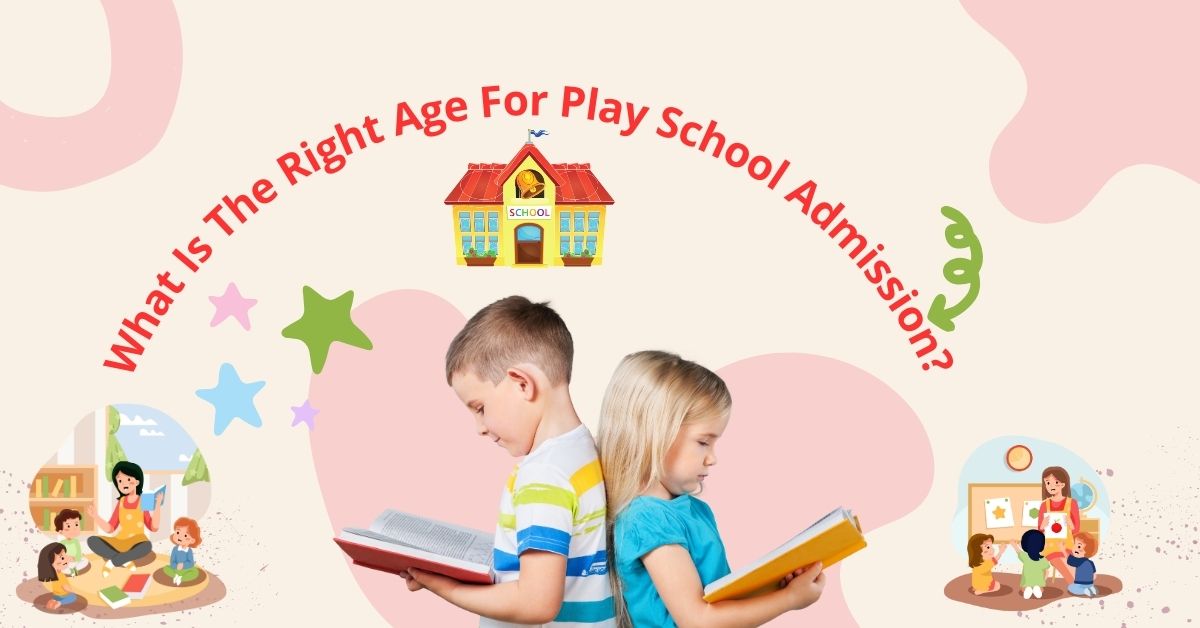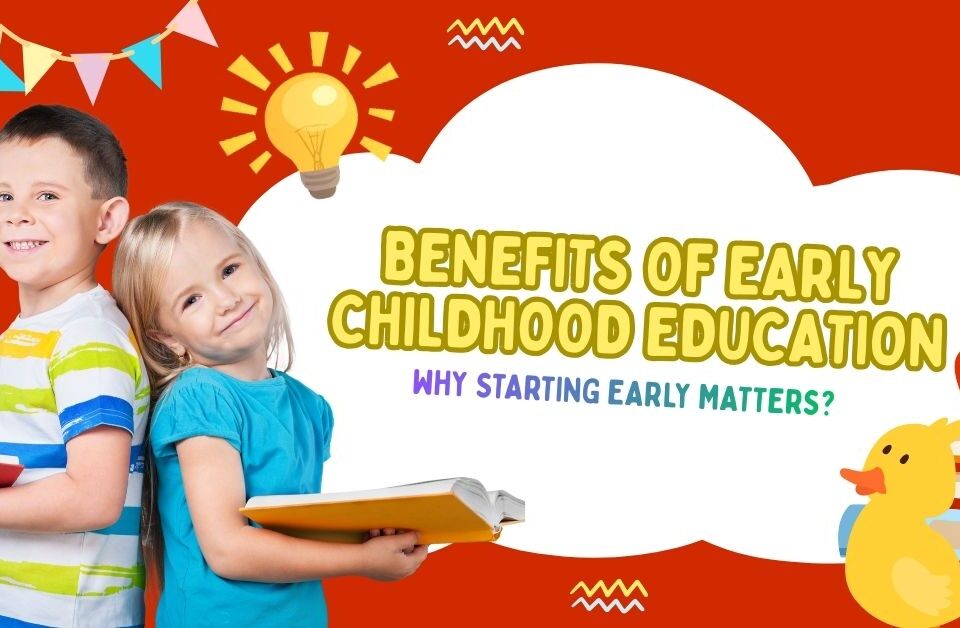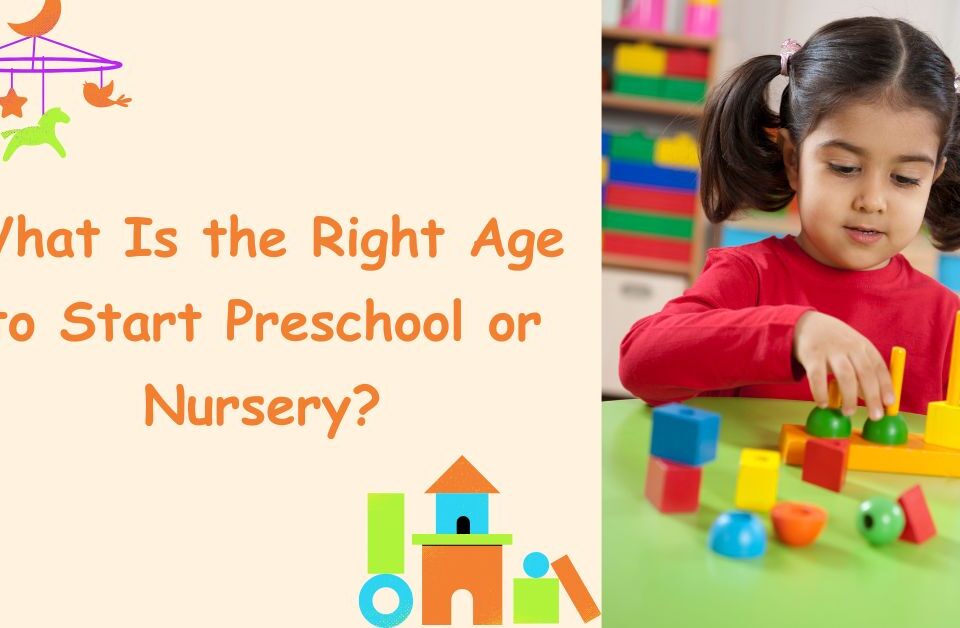
20 Fun Activities for Nursery Class Students: Educational Ideas for Kids
September 26, 2024
Top Challenges Preschoolers Face in School and Effective Ways to Overcome Them
October 29, 2024What Is The Right Age For Play School Admission?
Parents often find it difficult to determine the right age for play school admission for their kids. It is quite common to face a dilemma regarding whether an early admission is beneficial or if it could be doing more harm than good.
The best age for preschool admission depends on a lot of other factors. The purpose of this blog is to acquaint you with all the requirements for play school admission. This will help you ensure a safe, secure, and successful future for your child.
So, are you ready to find out the best age for play school admission for your child? Keep reading then!
Understanding Play School: What Is a Play School and Why Is It Important?
A play school, often referred to as a preschool, is an early childhood education setting designed for children between the ages of 2 to 4 years.
The primary purpose of a play school is to provide a structured and supportive environment where children can learn through play. Thus, a play school encourages them to develop essential skills such as communication, social interaction, and problem-solving.
However, when you’re considering play school vs. daycare, it’s important to note that daycare focuses primarily on child care. On the other hand, a play school emphasises cognitive and emotional development.
Hence, preschools lay a strong foundation for future academic success and ease the transition to formal schooling.
Also Read: Activities for Nursery Class Students: Fun and Educational Ideas for Kids
Key Factors Influencing Play School Admission: What Factors Should Parents Consider for Play School Enrollment?
1: Physical Development: Why Motor Skills Matter for Preschool Readiness
One of the most important preschool readiness signs is a child’s physical development. At the best age for playschool admission, children should be able to demonstrate basic motor skills such as walking and holding objects.
2: Emotional Development: The Importance of Emotional Maturity in Preschoolers
Emotional maturity is also necessary for a child’s successful entry into preschool. Thus, the right age for play school admission is when children start managing emotions like frustration and excitement healthily and successfully.
Also Read: Creating A Positive Learning Environment At Home For Your Child
3: Social Skills: How Social Interaction Prepares Children for School
Social skills are one of the most important developmental milestones for preschoolers. They indicate that a child is prepared to adjust and fit in group settings. Hence, the best age for preschool is when children begin to share, take turns, and interact positively with peers.
4: Separation Anxiety: Managing Pre-Admission Challenges
The best age for playschool admission is also when a child can remain calm without their parents for short periods. Hence, reducing separation anxiety is an important step in reaching developmental milestones for preschoolers.
5: Communication Abilities: The Role of Communication Skills in Play School Readiness
Lastly, the right age for play school admission is when children start communicating basic needs and thoughts. Thus, developing communication skills is one of the most significant preschool readiness signs.
Also Read: Importance Of Discipline In Students Life: Key to Academic Success & Personal Growth
The Best Age for Play School: What Age Is Best for Preschool Admission?
Research and expert opinions suggest that the best age for preschool generally falls between 2.5 to 3 years.
This range is considered the right age for play school admission because children at this stage typically begin to meet key developmental milestones such as improved motor skills, basic language abilities, and emerging social skills.
On the other hand, children around 2.5 years may still be adjusting to separation from their parents and developing independence. This makes early admission potentially challenging.
However, by 3 years, many experts believe children are better equipped to handle a structured environment as their cognitive and social skills are more refined.
It must be noted that there is not one right age for preschool admission. This is because some children may show preschool readiness signs earlier or later.
Hence, as mentioned in the previous section, it is necessary to emphasise the importance of individual assessment rather than a one-size-fits-all approach.
Also Read: Why Is Storytelling Important In Early Childhood Education?
Advantages of Early Preschool Admission: What Are the Benefits of Enrolling Your Child Early?
1: Cognitive Development: Enhancing Critical Thinking Through Early Learning
One of the most important benefits of early preschool education is enhanced cognitive development. When your child engages in structured activities arranged by a play school, it helps them develop critical thinking and problem-solving skills.
2: Social & Emotional Growth: Building Essential Skills
Early childhood education also supports social and emotional growth by teaching children how to interact with peers and manage emotions. It encourages them to develop empathy, cooperation, and emotional resilience.
3: Language Acquisition: Fostering Communication
Among the many benefits of early preschool education, developing language skills is extremely significant.
Preschools organise communication activities that help children expand their vocabulary, develop better listening skills, and enhance their ability to express thoughts and feelings effectively.
Also Read: Ways to Encourage Your Child to Be Physically Active
4: Boosting Self-Esteem: How Early Successes Contribute to Confidence
Early childhood education is also responsible for contributing to the self-esteem of a child. This is achieved by allowing children to experience small successes in a supportive environment.
It is one of the key benefits of early preschool education which helps kids gain confidence and a sense of accomplishment.
5: Laying the Groundwork for Academic Skills: Preparing for Formal Education Through Play
Early admission to a play school also helps children develop basic academic skills such as counting and recognising letters. It prepares them for formal schooling by laying the groundwork for a successful academic journey.
6: Long-Term Success: Future Impacts of Early Education
Last but not least, research indicates that early childhood education can contribute to future success. This is because the benefits of early preschool education extend beyond academics to influence long-term career and life outcomes.
Also Read: Top 8 Educational Activities For Preschool Kids to Enjoy At Home
Tips for Choosing the Right Preschool: How to Select the Best Preschool for Your Child
1: Location and Accessibility: Choosing a Convenient and Safe Preschool
While choosing the right preschool, you should only consider it if it’s situated in a location that’s easily accessible and safe.
A convenient location ensures less travel time which is beneficial for young children and allows parents to reach the school quickly in case of emergencies.
2: Caring and Competent Staff: The Importance of Qualified Educators in Early Education
A preschool with compassionate and reliable staff is essential for a nurturing and supportive environment.
Staff members should be trained in early childhood education, able to handle young children’s needs, and maintain a caring approach. Only this will ensure a positive preschool experience for your child.
Also Read: Developing Social Skills In Preschool Kids: Tips & Activities
3: Evaluating Rules and Regulations: What Safety Standards to Look For in Preschools
Choosing the right preschool also includes evaluating its rules and regulations. A well-structured preschool will have clear guidelines on safety, discipline, and health standards. This provides children with a secure environment and helps parents feel confident in their choices.
4: Creating a Child-Friendly Environment: Stimulating Learning Spaces
Moreover, the preschool should have a child-friendly setup including safe play areas, age-appropriate learning materials, and a welcoming atmosphere. A stimulating environment will encourage curiosity and creativity.
5: Checking Reviews and Reputation: Parental Feedback Matters
Finally, it is highly recommended to check reviews and reputation to ensure the preschool has a positive track record. Feedback from other parents and ratings can provide insights into the school’s quality. It will help you make an informed decision while choosing the right preschool.
Also Read: 10 Benefits Of Learning A Second Language At An Early Age
Conclusion: Determining the Right Age for Play School
It is extremely important to determine the right age for play school admission. However, this decision involves various factors including physical, emotional, social, and communication development.
While the best age for preschool generally falls between 2.5 to 3 years, individual readiness plays a key role.
Thus, it can be concluded that the best age for play school admission involves assessing your child’s developmental milestones and readiness. Only then you will be able to ensure a smooth transition to preschool and lay a solid foundation for your child’s future success.
JBM Smart Start, one of the best schools for toddlers, offers a nurturing and supportive environment for every child. Each of the highly qualified staff at this school is committed to ensuring a positive learning experience for your child. It ensures that your child learns and develops all the necessary skills and abilities required for further formal education.
FAQs: Common Questions About Play School Admission
Question 1: What is the right age to put a child in play school?
Answer: The right age for play school admission is typically 2.5 to 3 years. At this age, children often reach key developmental milestones like improved motor skills, social interaction, and basic language abilities.
Question 2: What is the best age for nursery school admission?
Answer: The best age for preschool or nursery admission is around 3 years when children usually exhibit signs of preschool readiness. This includes emotional maturity, social skills, and managing separation from parents.
Question 3: What is the right age for play school admission in India?
Answer: In India, the right age for play school admission commonly ranges from 2.5 to 3 years. This age range aligns with key developmental milestones for preschoolers.
Question 4: Should I consider enrolling my 2.5-year-old in preschool?
Answer: Enrolling a 2.5-year-old in preschool can be beneficial if the child shows preschool readiness signs like basic social skills and some independence. However, individual readiness varies, hence, it is highly recommended to assess your child’s developmental progress before deciding.
Question 5: Can starting to play school at an earlier age benefit my child?
Answer: Starting play school at an earlier age can offer benefits of early preschool education such as improved cognitive, social, and language development. However, it is necessary to ensure that your child is emotionally and physically prepared for a positive and successful experience.




